
 Thales (Miletus)
Thales (Miletus)
He was an important man! He predicted the solar eclipse of 28th May 585 remembered because of a battle taking place that day and he also did geometrical research which resulted in him measuring the pyramids, quite an important task.
Thales also researched physical phenomena for which he tried to give logical explanations. Although he was basing this research in a single element, water, which was rather unfortunate, his initiative gave a boost to the beginning of philosophy and science. He died after 547.
 Pythagoras (Samos)
Pythagoras (Samos)
Pythagoras of Samos (c.570-c.480) was also a philosopher who tried to find the true causes of things. He traveled a lot, first Egypt where he studied and then to India where he visited the Indian Brahmans since he believed in reincarnation. Then he moved to southern Italy where he founded a community of philosophers. According to his belief, our world is governed by numbers and this is the only way for harmony to exist.
 Heracletus
Heracletus
Unfortunately a large part of Heracletus work was lost so we donít have a complete idea of his thoughts although we do know that he thought of speech as the basic principle of the universe along with fire. Heracletus was born in Ephesus and he was a rich man.
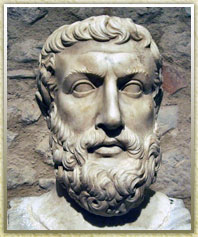 Parmenides (Elea)
Parmenides (Elea)
Parmenides lived in Italy and although he was intrigued by the immense variety of phenomena he thought that the endless variety and eternal changes were just an illusion. This idea was proven as one of the most influential in western culture.
 Demokritos (Abdera)
Demokritos (Abdera)
Demokritos was the one to state that matter is made of atoms giving this way an answer to the issue brought up from Parmenides about change. Atoms were always moving and clustering in various, temporary combinations and this was evidence that things change.
 Socrates (Athens)
Socrates (Athens)
The famous Athenian philosopher Socrates (469-399) had a great interest in ethics. It was his axiom that no one would knowingly do a bad thing. So knowledge was important, because it resulted in good behavior. If we are to believe his student Plato, Socrates was always asking people about what they knew and invariably they had to admit that they did not really understand what was meant by words like courage, friendship or even love. Socrates was heavily criticized. When his pupil Alkiviades committed treason, Socrates was in a very bad position and he was forced to drink poison after a charge that he had corrupted youth. Among his students were Antisthenes, Plato and Xenophon.
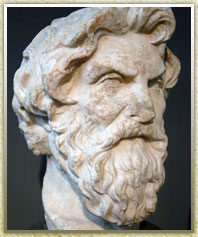 Antisthenes (Athens)
Antisthenes (Athens)
An Athenian and a pupil of Socrates, Antisthenes became the most important Athenian philosopher after the death of his teacher. Like Socrates, he was trying to find the meaning of words but he was convinced that it was not possible to establish really good definitions (a conflict reason with Plato). He only partially believed that someone who knew what was good, would not do a bad thing and he also added that people also have to be strong enough to pursue whatís good. He wanted his students to refrain from luxury and he recommended physical training of all kinds. His most famous pupil was Diogenes of Sinope.
 Plato
Plato
Although he was a student of Socrates, Plato, was also inspired by Parmenides. Plato accepted the world of the phenomena as a mere shadow of the real world of ideas. When we observe a horse, we recognize what it is because our soul remembers the idea of the horse from the time before our birth. In Plato's political philosophy, only wise men who understand the dual nature of reality are fit to rule the country. He made three voyages to Syracuse to establish his ideal state, both times without lasting results. Plato's hypothesis that our soul was once in a better place and now lives in a fallen world made it easy to combine Platonic philosophy and Christianity, which accounts for the popularity of Platonism during the antiquity.
 Diogenes (Sinope)
Diogenes (Sinope)
Diogenes was a student of Antisthenes and together they are the founders of Cynicism. The essential point in this view is that man suffers from too much civilization. We are happiest when our life is simple, which means that we have to live in accordance with nature just like animals. Human culture, however, is dominated by things that prevent simplicity such as money and our longing for status. Like his master, Diogenes refrained from luxury and often ridiculed civilized life. His philosophy gained some popularity because he focused upon personal integrity.
 Aristotle (Stagira)
Aristotle (Stagira)
He was Plato's most famous student, a Macedonian scientist who studied biology and founded a school in Athens. Most of his writings are lost but his lecture notes which were rediscovered in the first century BC are still available. During the last decades, scholars have started to re-examine the fragments of the lost works, which have led to important changes in our understanding of Aristotle's philosophy. What is generally thought is that Aristotle replaced his master's speculations with a more down-to-earth philosophy. His main works are Prior Analytics(in which he described the rules of logic), Physics, the Animal History, Rhetorics, Poetics, Metaphysics, Nicomachean Ethics and Politics, all classic books.
 Pyrrho (Elis)
Pyrrho (Elis)
Unlike the other philosophers who thought of rational thinking as the way to truth Pyrrho of Elis had his doubts about the quest of knowledge. He stated that we can not fully comprehend nature, we do not know for certain whether a statement is true or false so we are unable to build an ethical system on such a weak basis. The philosopher also thought that even though we had no moral absolutes, we should live by time-honored traditions. Pyrrho' s view is called Skepticism and may be compared to the postmodern philosophy of the 1980's.
 Epikouros (Samos)
Epikouros (Samos)
Epikouros (342-271) thought that people are happier when they are free from the pains of life and a virtuous life is the best way to reach this goal, that we are unable to understand the gods who may or may not have created this world and who arenít really interested in mankind and finally that we could not know anything about life after death. In antiquity, Epicurism was the most popular of all philosophical schools.
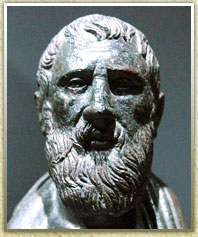 Zeno (Citium)
Zeno (Citium)
After the conquests of Alexander, the world was larger than ever and the city-state had ceased to be an important political unit. Like Diogenes of Sinope and Epicurus, Zeno of Citium (336-264 BCE) ignored traditional values like prestige and honor, and focused on man's inner peace which was reached when a person accepted life as it was, knowing that the world was rationally organized by speech. A man's mind should control his emotions and body, so that one could live according to the rational principles of the world. It has often been said that Zeno's ideas combine Greek philosophy with Semitic mysticism, but except for his descent from a Phoenician town in Cyprus and an interest in (Babylonian) astronomy, there is not much proof of that. This philosophy, called Stoicism, became very influential.
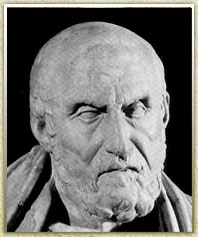 Cleanthes
Cleanthes
Zeno of Citium was succeeded as head of the Stoic school in Athens by Cleanthes. His contributions to the development of philosophy can especially be found in the field of logic, where he studied paradoxes and the way an argument should be created. He also reflected upon the use of allegoresis, which is a way to read a text metaphorically and find hidden meanings (or create them). From this point on, philosophers started to use the epics of Homer and the tragedies of Euripides as if they were philosophical treatises. Finally, Chrysippus was the man who concluded that if the rational principle of the universe, speech, was divine, the world could be defined as a manifestation of God.
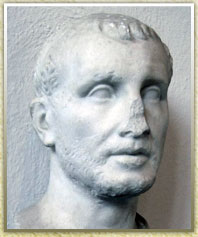 Posidonius (Apamea)
Posidonius (Apamea)
His works were lost but his books are often quoted by other authors. As a philosopher, he was not an innovator, but applied the theory to science and scholarship. For example, his Histories were a philosophical continuation of the World History of Polybius from Megalopolis. Among his other publications were treatises in which the Stoic world view was applied to everyday subjects such as anger, virtue and consolation. Being more interested in educating the masses than in theoretical purity, he often borrowed ideas from other schools.
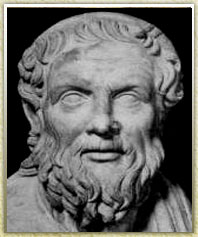 Apollonius (Tyana)
Apollonius (Tyana)
The charismatic teacher and miracle worker Apollonius lived in the first century AD. He was born in Tyana and gave a new interpretation to Pythagoreanism, which was essentially a combination of practice and mysticism. In his books on astrology and sacrifices he demanded bloodless offerings to God who expects needs nothing. This brought Apollonius into conflict with the religious establishment but he was recognized as a great sage and received divine honors in the third century.
 Plutarch (Chaeronea)
Plutarch (Chaeronea)
The Delphian oracle priest Plutarch of Chaeronea was immensely popular because he was able to explain philosophical discussions to a general audience. Among his moral treatises are treatises like checking anger, the useful art of listening, the fascinating how to know whether one progresses to virtue, and the charming advice to bride and groom. Plutarch also wrote double biographies, in which he usually compared a Greek to a Roman (i. e. Alexander and Julius Caesar). The result is not only an entertaining biography, but also a better understanding of a morally exemplary person that the reader can use for his own progress to virtue.
 Epictetus (Phrygia)
Epictetus (Phrygia)
He became a slave of emperor Nero's courtier Epaphroditus. When he was old and therefore useless he was freed so in order to make a living he started teaching the Stoic philosophy first at Rome and then in western Greece. Because of the fact that Epictetus was able to explain Stoicism in a systematic way he had many students from the rich senatorial order which ruled the Roman empire. Among these men were the future emperor Hadrian and the historian Arrian of Nicomedia, who published several of his conversations. Epictetus wrote a Handbook, probably the most popular book on philosophy that was ever written.
 Plotinus
Plotinus
It was not uncommon for philosophers of one school to borrow concepts and ideas from other branches of philosophy. Slowly the schools were merging, and a new synthesis (called Neo-Platonism) was created by Plotinus (205-270). Like Plato, he accepted that our world was a mere shadow of the world of ideas, which was in turn a shadow of an even higher world, which was again a shadow of God. In other words, the world has four levels of reality. God was the highest level, and then there were the levels of the intellect, the soul, and matter. According to Plotinus, the wise man would try to free his soul from matter and unite it to God. Plotinus achieved this mystical unity several times. His philosophy was adopted by the fathers of the church Ambrose and Augustine.





